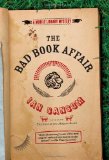Summary | Excerpt | Reviews | Beyond the Book | Read-Alikes | Genres & Themes | Author Bio

A Mobile Library Mystery
by Ian SansomThis article relates to The Bad Book Affair
 On his website Ian Sansom speaks about the role libraries have played in his life:
On his website Ian Sansom speaks about the role libraries have played in his life:
"Libraries are places where you go to invent and reinvent yourself, or maybe just to use the toilet, if they have toilet facilities, and to find out how other people have reinvented themselves, and what they've written on the walls, and the desks, and in the books; they're a wonderful hiding place, but also a way back out into the world. The whole point of a library is that you don't have to buy the books you read. You don't have to undergo the agony of going into bookshops, those brightly-lit half-houses of the soul, and shelling out your hard-earned cash for something that in all likelihood is only going to be fit for the fire, and which you're never going to read much past the first couple of chapters. The great truth and beauty of a public library is that you don't own the books: they, briefly, own you. There's probably a moral there, but if I pointed it out my editor, or my wife, or my agent would tell me not to talk such a lot of stuff and nonsense and just to get on and tell the story."
Sansom wasn't raised in a home where there were a lot of books, he says. But he and his friends all had library cards and made frequent trips to the local library. It's perhaps the biggest single influence on his ultimate career choice - even though Sansom claims "I would never tell anyone that I was a writer, not because it's a secret, but just because it sounds so daft - 'Oooh', I can hear my family and my friends and the great heavenly host of actual, real dead writers chorusing, 'He says he's a writer.'"
Sansom once made the statement that, "most books are used by authors and by readers just to waste time, or as a pretty basic means of self-amusement - books used like mental knitting, or television." At a reading of one his own books a library patron called him out, asking whether he thought his statement denigrated reading and writing. "Didn't it make [reading and writing] sound worthless and pathetic?" she asked. She further challenged him by suggesting that such a statement demonstrated his own "obvious superfluity, and [his] limited grasp of the potential of great literature to transform us and to make us anew." Sansom had to agree, saying that, "'mental knitting' is maybe not quite right," and adding, "I think it would be better to compare writing as an activity to making flapjacks."
Flapjacks or not, as not only an author but a prolific book reviewer Sansom is clearly devoted to the power of the written word and the buildings (or mobile vans) that house bound tomes. Expanding on his flapjacks/books analogy he says that writing, "takes longer, of course… and one hopes it gives people a little something to chew over. I think I could stand by flapjacks, even in a heated debate; no need to apologise for them, because I believe in the making of flapjacks in exactly the same way I believe in writing, as a small gesture of hope in the face of the unbeatable and overpowering logic of despair. The trouble is, you can never make enough flapjacks; they're always gone before you know it; the air-tight container has emptied. By writing, one hopes, there's more than enough to go around."
Filed under Books and Authors
![]() This article relates to The Bad Book Affair.
It first ran in the March 3, 2010
issue of BookBrowse Recommends.
This article relates to The Bad Book Affair.
It first ran in the March 3, 2010
issue of BookBrowse Recommends.
Your guide toexceptional books
BookBrowse seeks out and recommends the best in contemporary fiction and nonfiction—books that not only engage and entertain but also deepen our understanding of ourselves and the world around us.